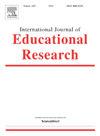卢旺达学生的成就动机。其认知-情感结构及其与学校成绩关系的混合方法研究
IF 2.5
3区 教育学
Q1 EDUCATION & EDUCATIONAL RESEARCH
引用次数: 0
摘要
卢旺达关于成就动机的研究很少。本研究以153名卢旺达中学生为样本,探讨了课堂动机和动机的认知-情感结构。它还探讨了动机与学校成绩之间的关系。定性内容分析显示,期望信念、学校效用和情绪是学生隐含动机的共同因素。在一个简单的列表练习中,学生指出他们与(a)动机联系在一起的科目。与年终成绩的双序列相关性表明(a)动机显著地预测了关键科目的成绩,如数学和物理。这表明动机是卢旺达学校环境中与教育相关的概念。有必要在卢旺达进行更多的动机研究,但需要考虑到其多层面性。本文章由计算机程序翻译,如有差异,请以英文原文为准。
Achievement motivation amongst Rwandan students. A mixed-method study of its cognitive-affective structure and associations with school grades
Research on achievement motivation in Rwanda is sparse. Using a sample of 153 Rwandan secondary school students, this mixed-method study explored the cognitive-affective structure of classroom motivation and amotivation. It also explored the relations between (a)motivation and school grades. Qualitative content analysis revealed that expectancy beliefs, school utility, and emotions were common factors of (a)motivation implied by students. Within a simple listing exercise students indicated what subjects they associate with (a)motivation. Biserial correlations with end-of-year grades revealed that (a)motivation significantly predicts achievement in key subjects, such as Mathematics and Physics. It suggests that motivation is an educationally relevant concept for the Rwandan school context. Additional motivational research in Rwanda is warranted but needs to take into account its multidimensionality.
求助全文
通过发布文献求助,成功后即可免费获取论文全文。
去求助
来源期刊

International Journal of Educational Research
EDUCATION & EDUCATIONAL RESEARCH-
CiteScore
6.20
自引率
3.10%
发文量
141
审稿时长
21 days
期刊介绍:
The International Journal of Educational Research publishes regular papers and special issues on specific topics of interest to international audiences of educational researchers. Examples of recent Special Issues published in the journal illustrate the breadth of topics that have be included in the journal: Students Perspectives on Learning Environments, Social, Motivational and Emotional Aspects of Learning Disabilities, Epistemological Beliefs and Domain, Analyzing Mathematics Classroom Cultures and Practices, and Music Education: A site for collaborative creativity.
 求助内容:
求助内容: 应助结果提醒方式:
应助结果提醒方式:


